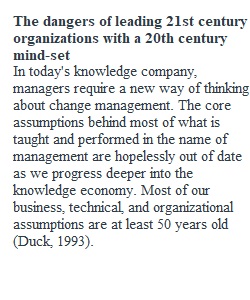


Q Engagement - Discussion Questions 1 All Sections 11 unread reply.1616 replies. Due: Tuesday Module 1 21st Century Leadership. As you respond to the questions below, please pay particular attention to the Rubric for this Assignment 1. What are the dangers of leading 21st century organizations with a 20th century mind-set (paradigm or way of thinking)? (Substantiate your response by including Duck's and Uhl-Bien et al.,'s articles below). Do you see such ‘dangers’ in your own professional experience? What are the consequences of such dangerous practices in your organization? 2. Uhl-Bien et al (2007) suggest that enabling leadership "works to catalyze the conditions in which adaptive leadership can thrive and to manage the entanglement...between...administrative leadership and emergent (adaptive leadership) functions of the organization" [Emphasis original] (p. 305). What are some examples of “enabling leadership” that you see in your workplace? What difference - if any - is it making in your workplace? 3. For this question, you are asked to refer only to Rost’s Interview. Rost identifies 4 variables influencing our thinking about leadership in our post-industrial and knowledge area. Which two variables are important to you in your thinking about leadership for the 21st Century and please explain why? Duck, J. (1993). Managing Change: The Art of Balancing. Harvard Business Review. Nov/Dec 93, 71(6), 109-118. Rost, J. (2005). 21st Century Leadership: An Interview with Joseph Rost. See https://www.google.com/url?sa=t&rct=j&q=&esrc=s&source=web&cd=1&cad=rja&uact=8&ved=2ahUKEwjLzaml0bnkAhXQTd8KHTR3DHIQFjAAegQIBRAB&url=http%3A%2F%2Fintegralleadershipreview.com%2F5633-a-fresh-perspective-21st-century-leadership-an-interview-with-joseph-rost%2F&usg=AOvVaw0kbfU63aXuRgB6rFQojBSI (Links to an external site.) Uhl-Bien, M., Marion, R., & McKelvey, B. (2007). Complexity leadership theory: Shifting leadership from the industrial age to the knowledge age. The Leadership Quarterly, 18(4) Post your answers to the Reply area. This is the first part of your submission, click Next to access the second part.
View Related Questions